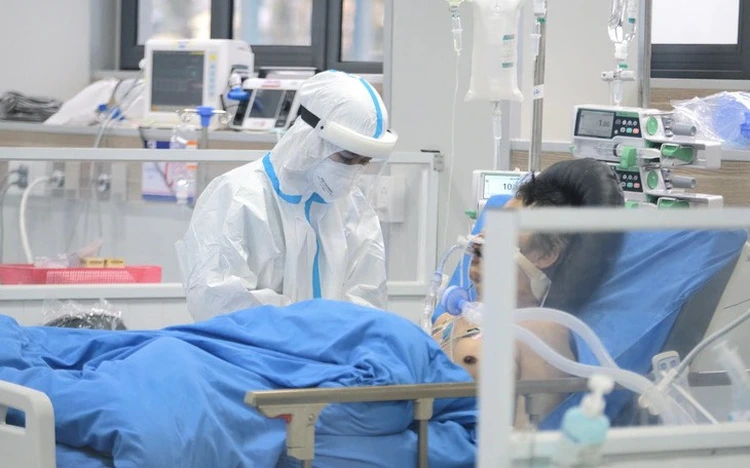
A COVID-19 patient is under treatment at a hospital in Hanoi, Vietnam, in 2021. Photo: Nam Tran / Tuoi Tre
According to the latest report issued by the Vietnamese Ministry of Health in conjunction with the World Health Organization (WHO), Hanoi and Hai Phong City accounted for 153 and 138 cases respectively, while Ho Chi Minh City reported 80 cases.
Following these are Quang Ninh, Bac Giang, Bac Ninh, and Thai Nguyen Provinces.
Over the past three weeks, there has been a slight upward trend in COVID-19 cases in Vietnam, particularly observed at central-level hospitals such as the National Children's Hospital in Hanoi.
In Ho Chi Minh City, the number of COVID-19 cases increased from 51 on May 16 to 79 by May 25.
Notably, the NB.1.8.1 variant, first identified globally in January 2025, has accounted for 83 percent of the recently sequenced samples in the city, indicating a rapid spread and clear dominance within just a few weeks.
However, WHO and the health ministry have stated that this new variant does not pose an increased public health risk compared to previous variants and has not shown signs of causing more severe symptoms.
As of mid-May 2025, the NB.1.8.1 variant has spread to 23 countries, including the U.S., Australia, Canada, the UK, South Korea, China, Japan, Thailand, and Singapore.
Symptoms associated with the NB.1.8.1 variant are typically mild, including low-grade fever, sore throat, cough, nasal congestion, and fatigue—often resembling the common cold, according to Dr. Nguyen Huy Hoang from the Vietnam-Russia Hyperbaric Oxygen Therapy Center under Vietnam’s Ministry of National Defense.
This similarity may lead individuals to underestimate the illness, forgo testing, and inadvertently contribute to community transmission, Dr. Hoang warned.
The health ministry affirms that it has prepared comprehensive plans for COVID-19 prevention and control. These include enhanced epidemiological surveillance in communities and healthcare facilities, and improvements in readiness for patient admission, treatment, and isolation.
Additionally, the ministry is strengthening training for healthcare workers on diagnosis, treatment, and outbreak management, and is closely collaborating with WHO to update international developments and adjust domestic strategies as needed.
While the situation remains under control, the ministry advises the public to continue adhering strictly to personal preventive measures, especially in crowded places, recreational areas, tourist destinations, hospitals, and schools.


Max: 1500 characters
There are no comments yet. Be the first to comment.